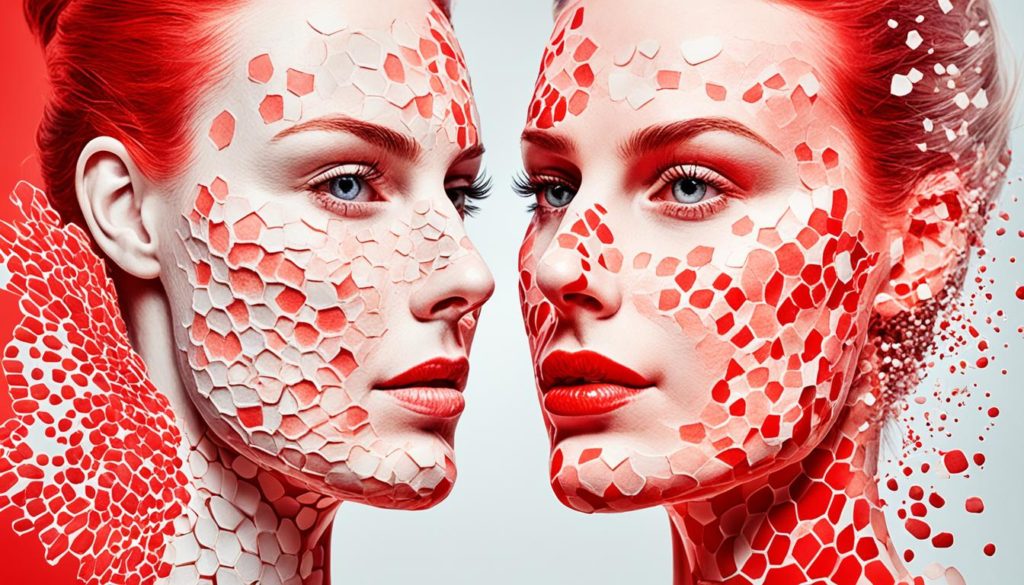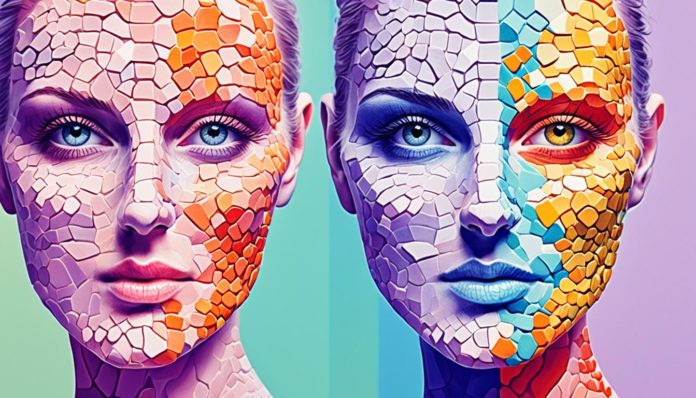Did you know nearly 31.6 million people in the U.S. have eczema? At the same time, about 50 million Americans battle acne yearly. These skin issues can deeply affect a person’s life. Finding the right treatments is key to controlling them.
We dive deep into dermatology’s world to show you treatments for eczema and acne. You’ll learn about everything from medicines to natural solutions. Knowing how these conditions affect lives is important. Luckily, new treatments are bringing hope to those dealing with them.
Key Takeaways
- 31.6 million Americans are affected by eczema, while 50 million suffer from acne annually.
- Understanding treatment options is essential for effective management of skin conditions.
- The guide covers both traditional and natural remedies for eczema and acne.
- Dermatological advancements offer new hope for treating these conditions.
- The guide aims to help individuals recognize the impact of eczema and acne on daily life.
Understanding Eczema
Eczema is a long-term skin issue that causes a lot of redness and itching. Many people in the U.S. have it. It comes from genetics and things around us.

Causes of Eczema
Eczema mainly starts from our genes but gets worse with things like irritating soaps and stress. Things like pollen or dust mites are also big triggers.
- Genetic predisposition
- Irritants like soaps and detergents
- Allergens such as pollen and dust mites
- Environmental factors
Symptoms of Eczema
Eczema makes skin red, very itchy, dry, and sometimes blisters form. This can really damage the skin. It may even lead to infections.
- Redness and itching
- Dry, cracked skin
- Blisters that may ooze
- Secondary infections
Impact on Daily Life
Eczema affects everyday life by causing a lot of physical discomfort and emotional upset. People with eczema deal with bad discomfort often. This makes daily tasks hard and can upset them a lot.
| Aspect | Impact |
|---|---|
| Physical discomfort | Constant itching and burning |
| Activities | Restricted due to flare-ups and inflammation |
| Emotional effects | Anxiety and depression |
So, knowing what causes eczema, how it feels, and its effects is key. Managing triggers can really help improve life for those dealing with it.
Decoding Acne
It’s vital to understand acne to manage it well. It happens due to hormonal shifts, stress, and clogged pores. We will look closely at these reasons, common symptoms, and how acne affects people mentally.

Causes of Acne
Several things cause acne. Hormonal changes during teenage years, pregnancy, or menopause can lead to it. Stress worsens acne by affecting hormones too. Excess oil, dead skin, and bacteria clog pores, causing acne.
Symptoms of Acne
Acne shows up in different ways, each with unique signs. Common symptoms are:
- Pimples (pustules)
- Blackheads (open comedones)
- Whiteheads (closed comedones)
- Cysts and nodules
These signs mostly appear on the face. They can also show up on the back, chest, and shoulders. Knowing these helps in spotting and treating acne early.
Psychological Effects of Acne
Acne’s impact isn’t just skin deep. The stress and shame from acne can hurt self-esteem and make people less social. It’s key to treat not just the acne, but also its emotional effects.
In short, understanding acne’s triggers, signs, and mental effects leads to better treatment. This makes tackling this widespread skin issue easier.
Eczema and Acne Overview
Eczema and acne are common skin issues that many people face. Even though they are different, both can cause a lot of discomfort. Knowing about these conditions helps in finding better treatments and improving skincare routines.
Getting the right diagnosis is key to treating these problems well. Eczema usually shows up as itchy, dry spots, while acne is more about pimples and blackheads. Knowing the difference helps in choosing the correct treatment.
“The correct identification of skin conditions such as eczema and acne is paramount in crafting personalized treatment regimens.” – Dr. Joshua Zeichner, Dermatologist
Treating these skin conditions needs a mix of medicines and skincare steps. Eczema often requires creams to calm the skin, and acne might need special medications.
| Condition | Symptoms | Treatment Options |
|---|---|---|
| Eczema | Dry, itchy patches |
|
| Acne | Pimples, blackheads, cysts |
|
In summary, tackling eczema and acne requires a carefully chosen method. This personalized approach really helps in managing these skin issues. It also plays a big part in keeping skin healthy.
Common Treatment Options
When dealing with eczema and acne, it’s key to know the treatment options. Consider prescription meds, over-the-counter items, and regular skincare routines.
Prescription meds are a big help. For eczema, there are corticosteroids. For acne, retinoids work well. Dermatologists prescribe them to target and ease symptoms.
| Treatment Type | Condition Treated | Common Medications | Benefits |
|---|---|---|---|
| Prescription Medications | Eczema | Corticosteroids | Reduces inflammation and itching |
| Prescription Medications | Acne | Retinoids | Prevents pores from clogging |
| Over-the-Counter Products | Eczema & Acne | Benzoyl Peroxide, Salicylic Acid | Keeps skin clean, reduces bacteria |
For both eczema and acne, many over-the-counter products like benzoyl peroxide and salicylic acid help. They keep skin clean and cut down on bacteria.
A good skincare routine is also crucial. It should include cleansing, moisturizing, and applying treatments. This helps manage eczema and stop acne from forming. By sticking to a smart skincare routine, your skin stays healthy and strong.
Natural Remedies for Eczema and Acne
Finding natural skincare solutions for eczema and acne is beneficial. Aloe vera, essential oils, and dietary changes are popular. They aim to improve skin health gently.
Aloe Vera and Its Benefits
Aloe vera is known for its cooling and soothing effects on the skin. It reduces redness and inflammation in eczema and acne. Applying aloe vera gel hydrates skin and speeds up healing.
Essential Oils
Tea tree, lavender, and chamomile oils are great for the skin. Tea tree oil fights acne bacteria with its anti-inflammatory properties. Lavender and chamomile oils calm irritated skin, good for eczema.
Dietary Changes
Your diet affects skin health. Eating omega-3 fats, fruits, and vegetables reduces inflammation. Avoid dairy, refined sugars, and processed foods for clearer skin.
Dermatological Advancements
In recent years, there has been a major leap in skin research. This has led to new treatments for those with ongoing skin problems. We will look at new topical treatments, the benefits of light therapy, and the newest meds.
Topical Treatments
With ongoing dermatological research, topical treatments are getting better. Now, doctors use biologics in creams to directly treat issues like eczema and acne. These cutting-edge treatments are more effective and have fewer bad effects, offering hope to patients.
Light Therapy
Light therapy is a key development in treating skin issues. Treatments like narrowband UVB and lasers help with psoriasis, eczema, and severe acne without surgery. Ongoing dermatological research is tailoring this approach for better results.
Innovative Medications
New meds are among the top advances, thanks to dermatological research. Biologics change the game by targeting the immune response to reduce inflammation. They offer new hope for chronic conditions, making a big difference where old treatments couldn’t.
| Treatment Type | Applications | Benefits |
|---|---|---|
| Biologics | Eczema, Severe Acne | Targeted action, Fewer side effects |
| Topical Formulations | General Skin Conditions | Improved delivery, Enhanced efficacy |
| Light Therapy | Psoriasis, Eczema | Non-invasive, Customizable |
The progress in dermatology is promising. It’s changing how we treat skin conditions, making a big difference for patients with the help of biologics and other cutting-edge treatments.
Daily Skincare Routine
It’s vital to have a daily skincare routine for eczema and acne control. This means picking products carefully and sticking to a gentle care routine. Here’s a guide on setting up a routine with the right cleansing, moisturizing, and products for sensitive or acne-prone skin.
Cleansing Methods
Cleansing is key for skincare. If you have sensitive or acne-prone skin, choose your cleanser wisely. Look for mild, fragrance-free options to keep your skin’s moisture intact. Use lukewarm water and be gentle to avoid irritation.
Gentle cleansing can help lessen breakouts and soothe eczema. Stay away from harsh ingredients and rough washing to keep skin calm.
Moisturizing Tips
Moisturizing is crucial, especially if you have eczema. Pick moisturizers with ceramides and hyaluronic acid. They help keep moisture in and repair the skin barrier. Always moisturize right after washing to lock in moisture.
For acne-prone skin, choose non-comedogenic moisturizers. Gel-based or light options hydrate without making acne worse.
Product Recommendations
Finding the right products is key for healthy skin. For eczema and acne, avoid alcohol, fragrance, and dyes. Try products from CeraVe or La Roche-Posay for gentle care.
To get an effective skincare routine, check out this Healthline article. It offers advice on picking products that meet your skin’s needs and avoiding irritants.
| Skin Concern | Recommended Cleansers | Moisturizers to Use |
|---|---|---|
| Eczema | Vanicream Gentle Facial Cleanser | CeraVe Moisturizing Cream |
| Acne-Prone Skin | La Roche-Posay Toleriane Purifying Cleanser | Neutrogena Oil-Free Moisturizer |
Keeping up with a gentle yet consistent skincare routine is crucial for managing eczema and acne. Follow these tips and product suggestions for healthier skin.
Medical Advice and Consultation
It’s key to talk to healthcare professionals to manage skin issues well. They can deeply check your skin to find the main cause of problems like eczema and acne. Making sure treatment is both safe and on point.
They can make a plan just for you. This plan looks at your health history and skin type. It aims for the best results.
Seeing your doctor often helps keep track of how you’re doing. They can change the treatment if needed. This way, your skin care adapts as your skin changes.
- Accurate Diagnosis: A deep skin checkup leads to finding out exactly what’s wrong.
- Customized Treatments: Making a treatment plan that fits your specific skin issues.
- Safety Measures: Making sure treatments don’t clash with other health issues or medicines.
Professional medical advice is crucial in skincare. Trusting doctors for treatment advice means you’re getting safe and effective care.
| Aspect | Benefit |
|---|---|
| Professional Guidance | Advice and treatments made just for you. |
| Regular Monitoring | Keeping an eye on progress to make changes as needed. |
| Safety Assurance | Making sure treatments are safe and work well. |
Trusting healthcare professionals with your skin can really improve how skin conditions are handled. It leads to effective and safe results.
Symptoms Management Strategies
Managing eczema and acne well means using different strategies. These target inflammation, itch relief, and treating scars. We’ll look at effective ways to lessen discomfort and make your skin healthier.
Reducing Inflammation
It’s vital to reduce inflammation for both eczema and acne. Anti-inflammatory treatments help soothe the skin. This makes everyday life more comfortable. Try natural ingredients like honey and oatmeal. They fight inflammation gently, perfect for sensitive skin.
Itch Control
Itching constantly can really bother eczema sufferers. You can stop the itch with different methods, like creams or antihistamines. Keeping your skin moist is also key. It helps you itch less. Make sure to have a daily skincare routine. This stops your skin from getting dry and itchy.
Acne Scarring Solutions
Fighting acne scars improves how your skin looks and boosts confidence. There are many scar treatments out there. From creams with retinoids to procedures like laser therapy. These treatments hide scars and help healthy skin grow. Using scar treatments regularly can change your skin for the better. Your skin will become smoother and clearer.
Prevention Strategies for Clearer Skin
To keep your skin clear, it’s crucial to use several prevention methods. Great skin care is more than just products. It’s also about healthy habits, avoiding bad environments, and going for regular skin check-ups.
Healthy Habits
Good habits are key for healthy skin. Eat well, drink plenty of water, and make sure you sleep enough. These steps boost how your skin looks and feels.
Environmental Factors
Avoiding harsh environmental factors is vital. Use sunscreen, steer clear of pollution, and keep your space clean. This protects your skin from damage.
Routine Check-ups
Seeing a dermatologist regularly is essential. They help spot and fix skin issues early. These visits keep your skin healthy in the long run.
Conclusion
To sum up, dealing with eczema and acne needs a complete approach for better skin and life quality. We’ve looked at their causes and symptoms, showing their big effect on daily life and mental health. It’s vital to know and tackle the root causes with natural remedies, dermatological treatments, or regular skincare.
Using natural ingredients like aloe vera and essential oils is beneficial. Changes in diet also play a key role. Plus, advanced treatments like light therapy and new medicines are promising. Getting help from doctors and creating a customized care plan helps lessen inflammation, soothe itching, and treat acne scars effectively.
Preventing skin problems is also crucial. Healthy routines, awareness of the environment, and regular doctor visits are key steps for better skin health. With the right knowledge and resources, you can manage your skin’s health and boost your confidence and comfort in life.
FAQ
What are the common causes of eczema?
Eczema stems from both genes and the environment. Irritants like soaps and cleaning products, allergens including pet dander and pollen, stress, changes in hormones, and different climates can trigger it.
What are the typical symptoms of acne?
Acne can show up as pimples, blackheads, whiteheads, and even cysts. They appear when pores get blocked. This blockage can be due to too much oil, dead skin, or bacteria.
How can eczema and acne impact daily life?
Eczema and acne can heavily affect one’s daily life. Eczema leads to severe itching and discomfort, affecting sleep and happiness. On the other hand, acne can cause low self-esteem and make people want to avoid social situations.
What are some effective treatment options for eczema?
For eczema, treatment might include prescribed meds like corticosteroids and topical calcineurin inhibitors. Moisturizing creams and avoiding certain triggers are also key.
Are there natural remedies for managing acne?
Yes, things like aloe vera and essential oils that reduce inflammation, along with changes in diet, can manage acne. It’s good to use these natural remedies with or as a supplement to traditional treatments.
What advancements have been made in dermatological treatments for skin conditions?
Recently, there’ve been big steps forward. This includes biologics for tough eczema cases, light therapy for acne, and new meds that work better and have fewer bad effects.
How important is a daily skincare routine for managing eczema and acne?
A gentle daily skincare routine is very important. Proper cleaning, moisturizing, and using the right products can help control symptoms. It also prevents bad breakouts, making the skin stronger and healthier.
When should I seek medical advice for my skin condition?
You should see a healthcare provider when store-bought treatments don’t work, your symptoms get worse, or you need a treatment plan that fits your specific condition.
What strategies can help manage symptoms like inflammation and itching due to eczema?
Managing eczema involves taking anti-inflammatory meds, placing cool compresses, keeping skin moisturized, and using itch treatments prescribed by a doctor, like topical steroids or antihistamines.
How can I prevent acne breakouts?
To avoid acne, adopt a healthy lifestyle. Eat well, drink plenty of water, don’t use harsh skincare items, manage stress well, and regularly visit a dermatologist.


